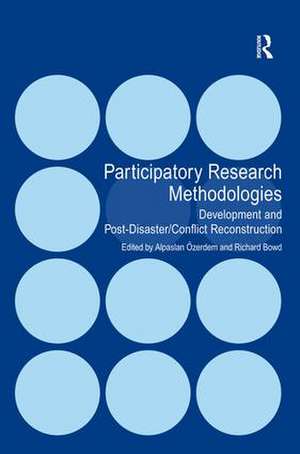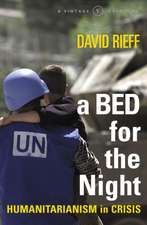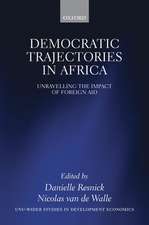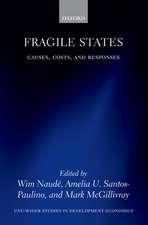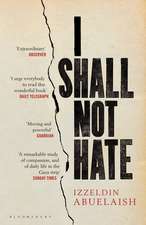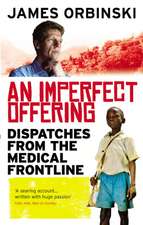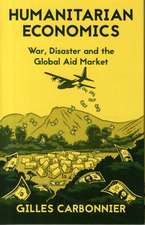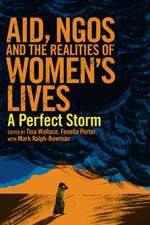Participatory Research Methodologies: Development and Post-Disaster/Conflict Reconstruction
Autor Alpaslan Özerdem, Richard Bowden Limba Engleză Hardback – 28 ian 2010
Preț: 1000.27 lei
Preț vechi: 1219.84 lei
-18% Nou
Puncte Express: 1500
Preț estimativ în valută:
191.40€ • 200.34$ • 159.31£
191.40€ • 200.34$ • 159.31£
Carte tipărită la comandă
Livrare economică 31 martie-14 aprilie
Preluare comenzi: 021 569.72.76
Specificații
ISBN-13: 9780754677352
ISBN-10: 0754677354
Pagini: 298
Dimensiuni: 156 x 234 x 18 mm
Greutate: 0.45 kg
Ediția:1
Editura: Taylor & Francis
Colecția Routledge
Locul publicării:Oxford, United Kingdom
ISBN-10: 0754677354
Pagini: 298
Dimensiuni: 156 x 234 x 18 mm
Greutate: 0.45 kg
Ediția:1
Editura: Taylor & Francis
Colecția Routledge
Locul publicării:Oxford, United Kingdom
Notă biografică
Dr Alpaslan Özerdem, Professor, Centre for Peace and Reconciliation Studies, The Enterprise Centre, ECG.2, Coventry University Technology Park, Coventry, UK and Richard Bowd, University of York, UK.
Recenzii
'...an extremely useful addition to the literature on research methodology, and provides excellent guidance for PhD students, academic researchers and policy makers who are interested in community-level research. The range of cases - from Afghanistan to Zimbabwe - means that the work is comprehensive and will be a "must read" for those about to embark on fieldwork.' Roger Mac Ginty, University of St Andrews, UK 'This book is to be commended for providing the first comprehensive, critical review of methods in this complex field. It covers a wide variety of environments, situations and techniques. The result is not only a compendium of valuable research experience but also an authoritative guide to a broad range of participatory methods.' David Alexander, University of Florence, Italy 'Unlike other volumes of collected essays Özerdem and Bowd's collection provides both depth and conjunctive elements... each article raises universal questions and issues that need to be considered in planning and carrying out research projects. Another quality that makes this volume worth reading is that it specifically raises awareness of the challenges that are involved in obtaining conflict-sensitive data. This is a thought provoking volume that addresses both, problems of research methods, as well as ethical issues, and is recommendable for researchers using participatory methods in development, post-disaster and post-conflict environments. Overall, this volume promises to be a very valuable resource for participatory-oriented researchers from various academic disciplines.' Journal of International Law of Peace and Armed Conflict
Cuprins
1: A Theoretical and Practical Exposition of ‘Participatory' Research Methods; I: Participatory Research Methods in Development and Post-disaster Reconstruction; 2: Introduction to Part I: Participatory Research Methods in Development and Post-disaster Reconstruction; 3: Who Speaks For The Community? Negotiating Agency and Voice in Community-based Research in Tanzania; 4: Poverty Assessment in Rwanda through Participatory Rural Appraisal; 5: Participatory Approaches to Impact Assessment: Experiences from Humanitarian Interventions in Zimbabwe; 6: Applications of Participatory Research Methods in a Post-disaster Environment: The Case of Cyclone Sidr, Bangladesh; 7: Rediscovering Traditional Knowledge for Post-disaster Reconstruction through ‘Participatory' Research Methods in India and Nepal; 8: Conclusion to Part I; II: Participatory Research Methods in Post-conflict Reconstruction; 9: Introduction to Part II: Participatory Research Methods in Post-conflict Reconstruction; 10: Understanding Social Capital and Reconciliation in Rwanda through Participatory Methods; 11: Door Knocking in Sierra Leone: A Necessity in Post-conflict Research; 12: Mapping Child Soldiers' Reintegration Outcomes in Liberia: A Participatory Approach; 13: A Participatory Approach to Ethnographic Research with Victims of Gross Human Rights Violations: Studying Families of the Disappeared in Post-conflict Nepal; 14: Unexamined Lives: A Methodology of Women, Violence and War in Lebanon; 15: Participatory Research in Programme Evaluation: The Mid-term Evaluation of the National Solidarity Programme in Afghanistan; 16: Participatory Research Methods in Post-conflict Reconstruction Study Visits; 17: Conclusion to Part II; 18: Conclusion: A Comparative Analysis of the Use of Participatory Research Methods in Development, Post-disaster and Post-conflict Contexts
Descriere
This informative text assesses the use of participatory methods as a research tool in the contexts of development and reconstruction after conflict and disasters by identifying cross-cutting themes and establishing a comparative lessons-learned framework. Rather than adopting a prescriptive perspective, the book provides a critical analysis of such methodologies.
